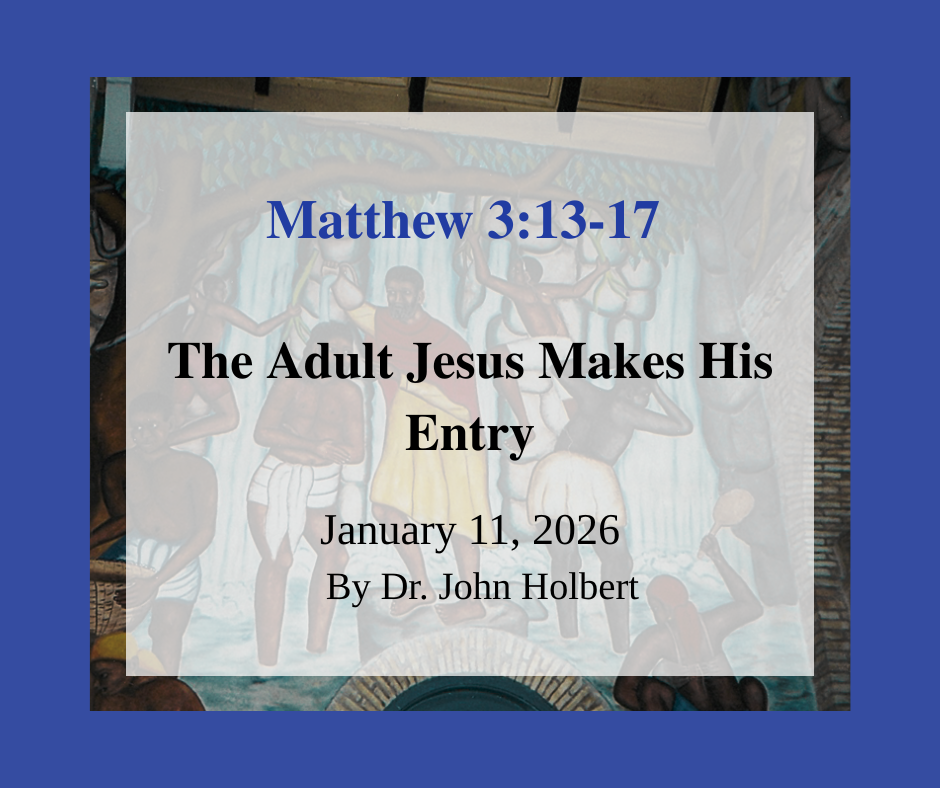The Adult Jesus Makes His Entry - Reflections on Matthew 3:13-17, Baptism of the Lord, Year A
by John C. Holbert on Tuesday, November 4, 2025

Matthew’s Gospel moves at breakneck pace. Jesus is no sooner born than he is necessarily whisked off to Egypt by parents fearful of a rampaging Herod. After his quick return to Nazareth, John the Baptizer’s ministry is described, including his own baptism and his fiery preaching. Then Jesus, now clearly grown up, shows up at the Jordan River “to be baptized by him (John)” (Mt.3:13). In barely two chapters of prose, Matthew gives us the adult Jesus, ready to begin his fateful ministry. He surely does not waste the reader’s time!
But the scene at the Jordan is described by Matthew as fraught with a surprising tension. “But John tried to prevent him (that is to be baptized by John), saying, “I have need to be baptized by you, and you come to me?” (Mt.3:14). Unlike the story that Luke tells, where it is unclear just who baptizes Jesus since John is already in prison (Luke 3:21), and also unlike Mark who says straightforwardly that “he was baptized by John in the Jordan” (Mark 1:9), Matthew tells us that John is reluctant to baptize Jesus, but instead suggests that Jesus should be baptizing him! The reader is perhaps eager to discover just why John questions Jesus in this way, but Matthew’s next sentence is obscure at best.
“Jesus answered and said to him, ‘Let it be for now! For thus it is fitting (NRSV “proper”) to fulfill all righteousness’” (Mt.3:15). Jesus will be renowned for providing complex replies to questions throughout the gospels, and this certainly is one of those. It follows John’s reluctance to baptize Jesus, and Matthew gives us no clear reason why he acts as he does. Is it merely that Jesus is superior to John, or is it possible that since John’s baptism is “for repentance” (Mt.3:11), Matthew implies that Jesus is somehow in need of the cleansing of his sins? John’s reason remains ambiguous at best.
And Mt.3:15 appears to offer us little further clarity. However, if the phrase is taken quite simply, it may mean that Jesus, though he is superior in every way to John as the rest of the Gospel will make abundantly plain, Matthew implies that Jesus here pledges to act precisely in accordance with John’s baptism which Matthew has said is designed to “produce good fruit” (Mt.3:10). Certainly, the work and ministry of Jesus will do nothing less than that, hence John’s baptism is fully an appropriate act for Jesus as he begins his saving work.
After Jesus is baptized, he “emerged immediately from the water, and look! the heavens were opened, and he saw the Spirit of God, descending like a dove, coming upon him” (Mt.3:16). The opening of the heavens is a sign that a new day of divine-human communication has dawned. In the Hebrew Bible and Apocrypha, several passages make the same point: Ezekiel 1:1; 2 Maccabees 3:24ff; 2 Baruch 22. In addition, in other New Testament places we may see the same claim: John 1:51; Acts 7:55-56; 10:11; Rev.11:19; 19:11-21. Also, when God’s Spirit comes down to rest on Jesus, it does so “dove-like,” an image that may well echo the very beginning of creation where we see “the Spirit of God moving over the surface of the waters” (Gen.1:2). Incidentally, Matthew’s statement that “he saw the Spirit” does not necessarily suggest that Jesus had here only a private vision; it may well imply a public experience, not unlike the picture one finds in Mark 1:10-11 and Luke 3:21-22.
“Look! A voice from the heavens was saying: ‘This is my son, the beloved, with whom I am well pleased’” (Mt.3:17). This sentence is carefully crafted. The voice from the heavens echoes the rabbinic bat qol, literally “daughter of a voice,” a metaphor for a divine word uttered from heaven. What the voice says is nothing less than a compendium of Hebrew Bible statements. “My son” comes from Psalm.2:7, where the Davidic king is said to be the adopted son of God. “Beloved” comes from the designation of Isaac as Abraham’s beloved son, nearly sacrificed on a mountain (Gen.22:2). And finally the phrase “with whom I am well pleased” derives from Is.42:1, the first of the four servant songs of 2-Isaiah, describing God’s faithful servant. These Isaianic songs played an outsized role in the definition of just who Jesus was for the early Christian communities.
Thus, once we absorb the scene at Jesus’s baptism, we are well on the way to knowing who Jesus is and what his work and mission will be. The Matthean composition here is nothing less than a masterpiece of skillful prose, a compact description leading the reader into the Gospel about to unfold. God’s beloved son will now begin his long journey to “fulfill all righteousness.”
